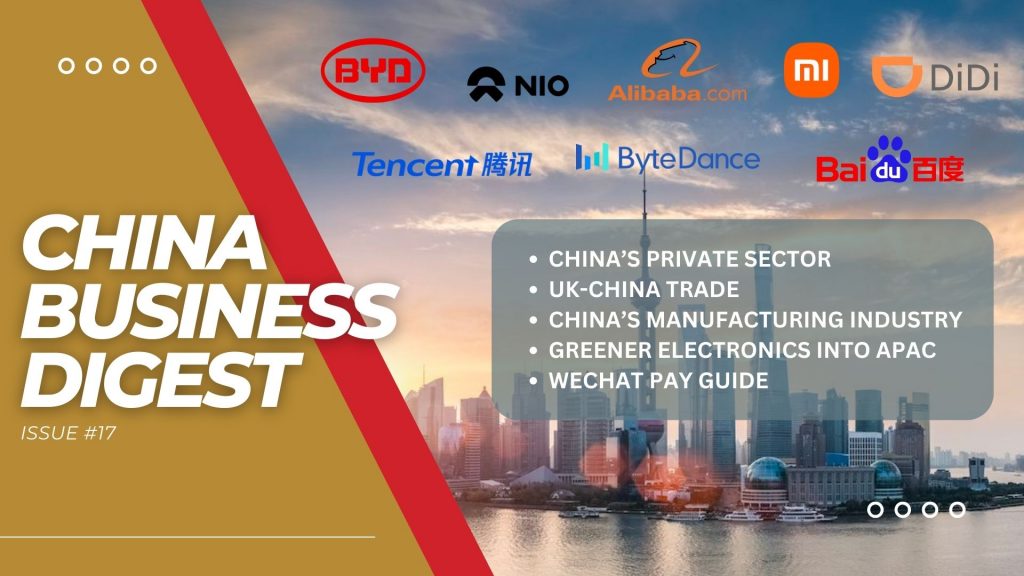Summary
- China’s Private Sector: new measures to boost the confidence of entrepreneurs
- UK-China Trade: the economic opportunity in China for UK businesses
- China’s Manufacturing Industry: the significance of UK and China collaboration
- Greener Electronics into APAC: Taipei chosen as the optimal 1st base for Cambridge GaN Devices
- WeChat Pay step by step: how to add your credit cards to your WeChat account
Hot Topic – Time for the Chinese private sector to shine again?

China unveiled on Monday detailed measures to spur private investment in infrastructure ranging from transport, water, clean energy and advanced manufacturing to agriculture.
This comes after the state planner, the National Development and Reform Commission (NDRC) last week released a statement with 31-point guidelines aimed at making the private sector “bigger, better and stronger” amid a slower than expected economic recovery, as reported by Global Times.
The NDRC also pledged to strengthen financial support for private-invested projects with a special fund from the central government budget to be set up to give annual support for 20 cities.
China’s tech giants, which are all privately-run, are expected to benefit from Beijing’s friendlier stance towards the private economy in recent months, writes South China Morning Post.
Last week, Premier Li Qiang said in a meeting with Big Tech firms that the government will set up a regular communication mechanism with internet companies, in Beijing’s strongest signal to date that it will lend strong support to the consumer tech industry and tone down more than two years of sweeping clampdowns.
Meanwhile, some experts argue that restoring the confidence of the entrepreneurs would require systemic changes that offer real protection of the entrepreneur class and private ownership, otherwise its promises on paper will “remain just words”.
According to Christopher Marquis, Sinyi Professor at Cambridge Judge Business School, most creativity and innovations in China come from the private sector, not the state-owned enterprises. Watch our expert interview with him on the topic of China’s private sector.
Experts Viewpoints – UK/China Trade

Is the UK’s fear of the Chinese state justified, or is paranoia preventing a lucrative partnership with the world’s second-largest economy? Our Founder & CEO, Ting Zhang had a lot to say on this subject when she was interviewed by Business Leader magazine recently along with two other experts in academia and industry.
“In 2021, the UK’s market share was still only 1.2% of all the goods and services China imported, so there’s still plenty of scope to grow. Exports, as we know, are crucial to a country’s prosperity, and China, as the world’s largest importer for many goods, can help the UK in its efforts to further engage bilateral trade deals post-Brexit.”
When asked about the impact of the UK government’s intervention in the eight attempted investments from Chinese companies in the last year, Ting says “it is hard to assess the longer-term effect to the overall economy but, in the short term, the UK companies involved may suffer an immediate loss of investment opportunities and that could result in job insecurity”.
You can read the article in full on Business Leader.
China Sector Insights

How important is the manufacturing industry to China’s economic growth and global competitiveness? And why is it still important for the UK and China to collaborate in manufacturing?
This article details Chinese government policies and strategies and gives an overview of the current manufacturing conditions in China and the UK, with a focus on electronic products.
Read on LinkedIn or on our website.
Case study

Cambridge GaN Devices Ltd (CGD) is a fabless semiconductor company designing, developing and commercialising energy-efficient GaN-based power devices to make greener electronics possible. As an important part of its global strategy, CGD has been developing its international business, particularly in APAC regions. To better manage business, culture, regulatory differences in the faraway countries, CGD decided that setting up a representative office in Taipei was the optimal option to start its first operation in Greater China. Read more.
China Travel Essential: How to link your credit cards to your WeChat account

If you are planning a trip to China, getting your WeChat pay working is a must-do before you go:
You can now link your Visa and Mastercard accounts to WeChat Pay and Ali Pay, China’s two major mobile payment platforms, and you can finally pay “like a local”! China has become largely a cashless society for daily essentials such as booking taxis, riding the subway and paying for goods and services at millions of outlets across the country. Here is a step-by-step guide on how to add your visa card (or Mastercard) to your WeChat account.
About Crayfish.io
Crayfish® has helped companies and institutions to succeed in China for over two decades. Our clients select from a portfolio of fixed-price digital services and bespoke strategic consulting to accelerate their market entry, reduce risk and maximise their commercial opportunities. Whilst tech innovators and businesses, and education and research institutions, benefit from unique solutions to protect, manage, and commercialise Intellectual Property in China that may otherwise have remained unexploited.
Our approach is based on four commitments – commercial confidence, connections, cultural guidance, and cost certainty – providing you the maximum benefits of doing business, with the minimum risk and exposure.
Whether you are new to doing business with China or are looking to expand, Crayfish® has the solution.
